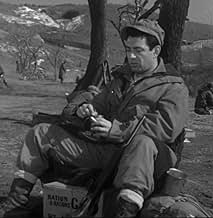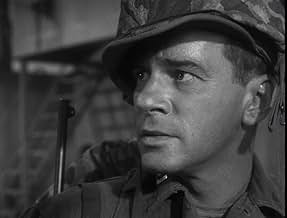The saga of a battalion of U.S. Marines during the Korean War, starting with their training, landing at Inchon in 1950, advance into North Korea and their subsequent retreat back to the 38th... Read allThe saga of a battalion of U.S. Marines during the Korean War, starting with their training, landing at Inchon in 1950, advance into North Korea and their subsequent retreat back to the 38th parallel.The saga of a battalion of U.S. Marines during the Korean War, starting with their training, landing at Inchon in 1950, advance into North Korea and their subsequent retreat back to the 38th parallel.
Russ Tamblyn
- Jimmy W. McDermid
- (as Rusty Tamblyn)
Nedrick Young
- Sgt. Novak
- (as Ned Young)
Morton C. Thompson
- Capt. Kyser
- (as Mort Thompson)
John Bradford
- Radio Operator
- (uncredited)
William Cabanne
- Boxum
- (uncredited)
Sue Fawn Chung
- Child
- (uncredited)
Jack Daley
- Doctor
- (uncredited)
Fred Datig Jr.
- Marine
- (uncredited)
Featured reviews
War is hell. This grim movie bears that out. At least this black and white movie is consistent from start to finish as it portrays United States Marines landing and later retreating in the frozen hell of Korea. The movie's redeeming qualities are its educational aspects and the actual combat footage. Story, dialog, casting, acting and special effects are all about average. I thought the characterization was better than average at times, as it showed Marines struggling with loss, despair, fear, hope, joy and even expressing compassion. Korea has been termed the forgotten war. That is unfortunate as it was and still is very relevant, even to this day. Witness the recent demonstration of nuclear power by North Korea and the consternation it has generated. The younger generation should be aware of our nations history and this movie can be a fun and enlightening way to do so. They might wonder what Chinese soldiers are doing there. At one point our movie's characters are almost saying a famous line from a later movie--"Who are these guys?" Overall, Retreat, Hell! is a respectable war movie.
This film essentially begins with a Marine Corps Reserve officer by the name of "Captain Paul Hansen" (Richard Carlson) being informed that he has been called into active service due to an outbreak of hostilities in Korea. Naturally, being a family man, he doesn't particularly want to go to war but, since he has no choice, he follows orders and reports for duty. Upon doing that, however, he is shocked when his superior officer "Lieutenant Colonel Steve L. Corbett" (Frank Lovejoy) informs him that, rather than being assigned in an electronic specialty, he is given an infantry company to command instead. Although being somewhat out of his element, Captain Hansen does his best to adapt to his new situation even though Lieutenant Colonel Corbett is sometimes critical of his progress. Be that as it may, after extensive training in the United States, the Marine Corp division is shipped out to Korea just in time to conduct an amphibious landing near the port of Inchon. From that point on, Captain Hansen and his men learn firsthand the horrors of war against an enemy that shows little mercy and takes no prisoners. Now, rather than reveal any more, I will just say that this turned out to be a decent war movie which managed to show the raw emotions American soldiers felt having to engage in combat on the other side of the world. Admittedly, there were some parts that were a little corny and I would have preferred a more complete ending but, all things considered, I liked this movie and I have rated it accordingly. Slightly above average.
"Retreat, Hell!" is an unusual film because Hollywood didn't make all that many movies about the Korean War compared to WWII. It follows a Marine unit from the invasion of Inchon through the first tough winter when the Chinese entered the fray.
The film does what too many war films do...uses too much stock footage that is scratchy and clearly NOT made for the movie in the first place. Aside from this, the story is reasonably well done, though most of the characters are a bit one-dimensional. Not a bad overview of this period, though.
The film does what too many war films do...uses too much stock footage that is scratchy and clearly NOT made for the movie in the first place. Aside from this, the story is reasonably well done, though most of the characters are a bit one-dimensional. Not a bad overview of this period, though.
The Korean War doesn't have the glory that goes with WW2, although there are a few films about that war that have helped shape an image of bitter fighting carried out in even more bitter weather conditions. Retreat, Hell! should be right up there with Pork Chop Hill as the definitive Hollywood depiction of that conflict. It has that deft mix of grim authenticity, of action, and of fine characterizations. It has to be one of Russ Tamblyn's best dramatic parts. A lot of well interspersed and well done action scenes of fighting in barren snow swept hilltops and ravines, with the finale being a furious Chinese charge right into the colonel's tent. In black and white, this film has a pervasive grimness to it, that contrasts with the story of a unit of Marines trying to keep up a sunny and positive spin on a desperate situation. It's a flag-waver, but exceedingly well done.
The movie traces Marine combat battalion from training base in California to South Korea's Inchon landing to North Korea's Chosin Reservoir and retreat from there to the coast for naval rescue.
Several notable features are in this otherwise fairly routine war film. First, it's surprisingly de-politicized for its sensitive time period. The movie was produced in 1952, at a time when the war in Korea had stalemated and anti-communist fervor (Senator McCarthy) was at a fever pitch stateside. One would expect a lot of talk about red aggression and Chinese hordes. However, there's hardly any explanation in the narrative about where the war is or why it's occurring! Instead, the screenplay focuses almost exclusively on Marine Corps professionalism from officers to NCO's to recruits.
Looks to me like the movie's purpose is to restore the Marines' popular image following the Chosin debacle, without getting involved in messy politics. After all, Marine combat in WWII had been one of steady advance across the Pacific; at the same time, footage of retreat in Korea shook American confidence in that murky war.
Another notable feature is the low-budget film's effort at recreating the horrendous winter weather that plagued the retreat. I recall newsreels of the time of the steep mountains and freezing snow being almost as scary as the combat itself. I doubt the retreat over those mountain passes would have succeeded without the continuous air support.
Notable too is the general absence of sometimes silly small talk that characterizes so many WWII combat films. That's understandable since the war in Korea was never popular and little understood at home, especially after the massive Chinese intervention. On the other hand, there's the kind camaraderie and bonding among the troops that could be expected, but none of the light-hearted victory-is-certain banter of 10-years earlier.
As other reviewers note, the combat itself is mostly a series of clichés. However, the acting is good and Tamblyn is perfect for his idealized all-American-boy role. But the movie itself is now largely a curiosity dramatizing as it does one of America's few military retreats.
(In passing—in my little book, the war was characterized by two massive blunders—first, North Korea's reckless belief that the US would tolerate a unified communist Korea only a few hundred miles from post-war Japan; and second, Gen. MacArthur's over-confident belief that China would somehow allow an American army on China's border {the Yalu river}. The result of these blunders was 3-years of war, thousands of dead, and most ironically, a return afterward to the same divided country {38th Parallel} as before the devastation!)
Several notable features are in this otherwise fairly routine war film. First, it's surprisingly de-politicized for its sensitive time period. The movie was produced in 1952, at a time when the war in Korea had stalemated and anti-communist fervor (Senator McCarthy) was at a fever pitch stateside. One would expect a lot of talk about red aggression and Chinese hordes. However, there's hardly any explanation in the narrative about where the war is or why it's occurring! Instead, the screenplay focuses almost exclusively on Marine Corps professionalism from officers to NCO's to recruits.
Looks to me like the movie's purpose is to restore the Marines' popular image following the Chosin debacle, without getting involved in messy politics. After all, Marine combat in WWII had been one of steady advance across the Pacific; at the same time, footage of retreat in Korea shook American confidence in that murky war.
Another notable feature is the low-budget film's effort at recreating the horrendous winter weather that plagued the retreat. I recall newsreels of the time of the steep mountains and freezing snow being almost as scary as the combat itself. I doubt the retreat over those mountain passes would have succeeded without the continuous air support.
Notable too is the general absence of sometimes silly small talk that characterizes so many WWII combat films. That's understandable since the war in Korea was never popular and little understood at home, especially after the massive Chinese intervention. On the other hand, there's the kind camaraderie and bonding among the troops that could be expected, but none of the light-hearted victory-is-certain banter of 10-years earlier.
As other reviewers note, the combat itself is mostly a series of clichés. However, the acting is good and Tamblyn is perfect for his idealized all-American-boy role. But the movie itself is now largely a curiosity dramatizing as it does one of America's few military retreats.
(In passing—in my little book, the war was characterized by two massive blunders—first, North Korea's reckless belief that the US would tolerate a unified communist Korea only a few hundred miles from post-war Japan; and second, Gen. MacArthur's over-confident belief that China would somehow allow an American army on China's border {the Yalu river}. The result of these blunders was 3-years of war, thousands of dead, and most ironically, a return afterward to the same divided country {38th Parallel} as before the devastation!)
Did you know
- TriviaWhen asked if they were retreating, Frank Lovejoy's character, Lt. Col Steve Corbett, says, "Retreat, hell! We're not retreating, we're just advancing in a different direction." This was actually said by Maj. Gen. O.P. Smith, who was Commanding General of the 1st Marine Division at the Battle of Chosin Reservoir.
- GoofsAfter Captain Hansen interviews Private McDermid at Camp Pendleton, he tells him to put his cap on. Marines do not use the term 'cap'. The correct term is 'cover'.
- Quotes
Lt. Col. Steve L. Corbett: Retreat hell! We're not retreating, we're just advancing in a different direction.
Details
- Runtime
- 1h 35m(95 min)
- Color
- Aspect ratio
- 1.37 : 1
Contribute to this page
Suggest an edit or add missing content



























